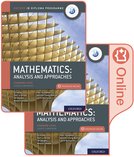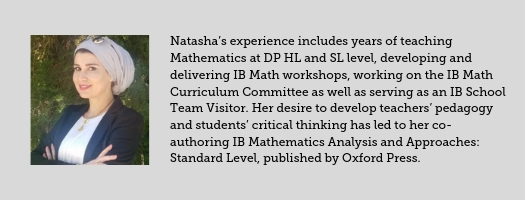DP Maths: Developing conceptual understanding in Mathematics
Conceptual understanding is essential for learning mathematics. It is very important for students to know “why” they are learning this topic in Mathematics in order for them to apply it to different contexts. Often students memorize facts, procedures, and algorithms but end up not knowing how to use them when they are given different situations. For example, when they are learning about differentiation, which is the process of finding the rate of change of a function with respect to one of its variables, they can follow the algorithm to derive a function. On the other hand, students get lost in solving unforeseen problems that are related to the same concept. For instance, will they be able to use what they have learned to find the fastest speed of a runner at any particular moment? Students can answer such questions when they conceptually understand Calculus. Learning the facts, rules and algorithms for differentiation will not get students to the place where they are able to grasp the concept and thus this will not help them to relate it to real life situations. Only when contextualizing calculus with real life examples, students’ conceptual understanding is enhanced and thus they can creatively solve unfamiliar problems.
As a Math Higher level teacher, it is very important for me that students develop both conceptual understanding and procedural understanding in order for them to understand mathematics. A student with developed conceptual knowledge has the tendency to grasp mathematical concepts and apply them correctly to a variety of situations. Some mathematics books are structured in a way that stresses on procedures without taking into consideration the conceptual understanding. The new OUP mathematics books adopt the concept based approach in which the emphasis is on “understanding and doing” mathematics rather than “doing” mathematics. The chapters in the book are rich with investigations that help students retain their knowledge longer and develop their abilities in solving non-routine problems. Every chapter has set of investigations which include factual and conceptual questions that lead students toward the topical understanding for this investigation. Those questions are thought-provoking and help students make connections and see the big picture. Moreover, the structure of the investigation is set in a way that engage students at higher level of thinking. Each task provides students with opportunities to apply previously learnt knowledge and use mathematical concepts to make links to other topics and real-life contexts.
The overall aim is to produce conceptually trained learners who can creatively solve unfamiliar problems and arrive to questions and ideas that may interest them to explore about.
My name is Natasha Awada and I am one of the co-authors for the new IB DP Mathematics: analysis and approaches, standard level textbook.
Search results
|
Product 
|
Oxford IB Diploma Programme: IB Mathematics: analysis and approaches, Standard Level, Print and Enhanced Online Course Book PackAuthor Paul La Rondie, Author Jill Stevens, Author Natasha Awada, Author Jennifer Chang Wathall, Author Ellen Thompson, Author Laurie Buchanan, and Author Ed Kemp 978-0-19-842710-0 Pack | 21/02/2019 Price: £72.99 +VAT |
© 2024 Oxford University Press. All rights reserved.




